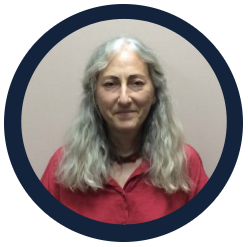Peg Nemoff

When Peg Nemoff, a Remedial Projects Manager in Land Management Administration, moved to Baltimore City in 1984, she was struck by the inhumane methods used to eliminate feral cats in her neighborhood.
Three decades later, Peg is widely recognized as one of the region’s most important feline saviors through her work using the concept of “trap, neuter, and return” (TNR) to return the cats to their surroundings. Her nonprofit group Community Cats Maryland Inc. has spayed thousands of cats in the Baltimore area over the years.
“I always knew you had to spay and neuter your pets, but then I started seeing them living on the street, and I knew I wanted to do something to help them,” she said. Peg learned how to do TNR while partnering with Animal Rescue Incorporated (ARI). First, animal workers place cat traps in the afflicted area. Once the cats have been enticed into the cage, they are taken to an animal shelter or clinic, where they are neutered, vaccinated for rabies and ear tipped, making feral cats instantly recognizable as participants in a managed feral colony. The animals are cared for and fed through the process, and after the cats have recovered they are released to the area from where they were collected. This process reduces overpopulation while allowing for a humane and gradual attrition of the feral colony.
Peg became increasingly active in the animal community after observing several local ‘Neuterathons’ for male animals. She then helped plan and execute several ‘Spayathons’ for female feral cats. In association with the Maryland Feline Society (MFS), she convinced veterinarians to perform reduced-cost surgeries.
Perhaps her greatest accomplishment came in 2003, when Peg partnered with MFS and ARI to reduce the feral cat population on Smith Island, a small Chesapeake Bay island. ”We decided to focus our efforts in one area, because you get more of an impact in a higher concentration,” she said. The project was an astounding success and all 244 feral cats living on the island were neutered over the course of a year.
After Smith Island, Nemoff convinced Baltimore City Animal Control to allow a Pilot TNR project. At the time, the TNR process was illegal in most counties in Maryland. According to the law at the time, the only course of action was to trap and euthanize the offending animals, pitting animal control against animal activists. Nemoff wanted to prove to the city that TNR was more humane as well as more effective than its regulations at the time.
Focusing on the North Patapsco region, the TNR project collected and treated more than 40 cats. Baltimore City residents were so grateful that they flooded Animal Control with letters of support, and the project continued. In 2007, almost entirely due to the efforts of Nemoff’s grassroots campaign, Baltimore City Ordinance 07-583 was passed, officially legalizing TNR in the city and recognizing TNR as the preferred method of feral cat control.
Peg then formed Community Cats Maryland Inc. in 2009. According to Nemoff, “We formed the organization for two purposes. One, to run clinics on our own terms, and two, to educate the public and change laws.”
The volunteer-based CCMD TNR program has had incredible success in the city. Due to the City’s support for TNR, on July 1, 2013, the Baltimore Animal Rescue and Care Shelter (BARCS) was able to obtain a million-dollar grant from Petsmart Charities, administered by Best Friends, to spay and neuter 10,000 feral and outdoor cats throughout the city. In addition, the group offers feral cat clinics throughout the Baltimore metro area, runs yearly seminars on constructing feral cat shelters as well as best management practices.
Community Cats Maryland Inc. is looking for volunteers, in particular people with carpentry, sewing, and tech skills, as well as volunteers with large vehicles with an interest in humane trapping.
For more information or to get involved, follow CCMI on Facebook, or visit its website.